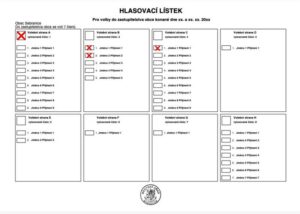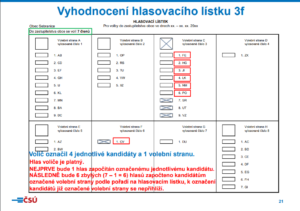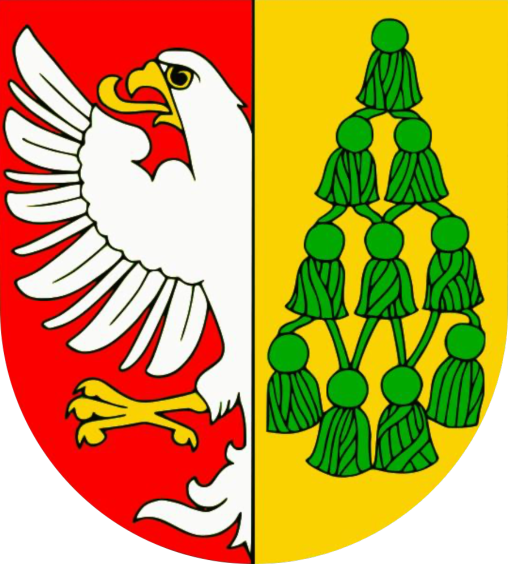The results of the elections to the Vestec Municipal Assembly, which took place on 23-24 September 2022, can be found at www.volby.cz
Elections to the Vestec Municipal Assembly will take place on 23-24 September 2022. At the same time, elections to 1/3 of the Senate of the Parliament of the Czech Republic will take place in Vestec.
The last ordinary elections for municipal councils were held on 5 and 6 October 2018, meaning that the term of office of the municipal councils will expire on 6 October 2022.
Information for voters - Municipal elections in 2022
The polling station for all voters in the municipality of Vestec is located in the building of the kindergarten Vestec (U Hřiště 576, Vestec), next to the football field. The polling station will be open at Friday, September 23, 2022 from 2:00pm - 10:00pm, and Saturday, September 24, 2022 from 8:00am - 2:00pm.
A voter may, for serious, especially health ones, reasons to ask the municipal office and on election day your precinct election commission that could vote outside the polling station in a portable ballot box. However, a district election commission may only send its members with a portable ballot box within its electoral district - i.e. within the cadastre of the municipality of Vestec. To order a portable ballot box, please call on official days to the Vestec Municipal Office at tel. 313 035 501 a on election days at 724 09 09 07. The walk will take place on Saturday morning.
Who can vote?
- The right to vote is citizen of the Czech Republicwho is at least 18 years of age on the second day of the election and who is registered as a permanent resident of the municipality on the day of the election.
- The right to vote is citizen of another EU country, who has at least reached the age of 18 on the second day of the election, is registered as a permanent or temporary resident (must be a registered resident) in that municipality on the day of the election, and if himself asked to be added to the permanent register of electors no later than 16:00 on Wednesday 21 September 2022 at the Vestec municipal office (Vestecká 3, Vestec). Citizens of another EU Member State who have applied for registration remain registered in the supplement to the permanent electoral roll until they themselves have applied to be removed or have lost the right to vote. Moving within the Czech Republic does not extinguish the right to vote; the information about the registration in the supplement to the permanent electoral roll "moves" with the EU citizen voter.
When can you not vote?
Obstacles to the exercise of the right to vote are:
- Statutory restriction of personal liberty on account of imprisonment
- restriction of legal capacity to exercise the right to vote
- statutory restriction of personal liberty to protect public health (quarantine)
- performance of service as a soldier on call-up abroad or as a soldier in reserve abroad
Proof of identity
The voter must prove his/her identity and citizenship of the Czech Republic at the polling station
- a valid ID card,
- a valid passport of the Czech Republic,
- in the case of foreigners, a permanent residence permit or temporary residence certificate (from 2 August 2021, a registration certificate)
If the voter fails to prove his or her identity and citizenship with the necessary documents, he or she will not be allowed to vote.
Voting process
The voter receives a blank official envelope with an official stamp from the precinct election commission. On request, the commission will also issue a ballot paper.
In the 2022 concurrent election, the voter will receive a GREY envelope for the municipal election and a YELLOW envelope for the Senate election. The colour of the envelope corresponds to the colour of the ballot paper - grey for the Municipal Council, yellow for the Senate.
Each voter votes in person, no proxy voting is allowed.
The voter enters with the official envelope and ballot paper to the area designated for the processing of ballot papers. A voter who is unable to adjust the ballot paper due to a physical defect, or who cannot read or write, may be accompanied by another voter, but not by a member of the precinct election commission, in the ballot paper adjustment area and have the ballot paper adjusted and placed in the official envelope, or the official envelope placed in the ballot box.
The number of municipal councillors to be elected in a given municipality is indicated at the head of the ballot paper - 15 members will be elected in the 2022 municipal council elections.
Ballot is REQUIRED EDIT in one of these ways:
- Mark with a cross in the square in the column header only one electoral party before the name of the electoral party. This gives a vote to the candidates of that electoral party in the order of the number of members of the municipal council to be elected. If a voter marks a cross with a ballot party, he/she no longer marks specific candidates in that ballot party. The marking of the candidates for that electoral party shall not be taken into account in such a case.
- Mark in frames a cross in front of the candidates' names of this Candidate, for whom the voter votes, namely from any electoral party. The highest number of candidates that can be marked is the number of members of the municipal council to be elected - for the elections to the Vestec Municipal Council in 2022 you can choose maximum 15 candidates. If you vote for less than 15 candidates, your vote is still valid.
- Combine both ways and mark one electoral party with a cross, and then in the box in front of the candidate's name, other candidates from any other electoral parties. In this case, the vote is given to the individually marked candidates. Only as many candidates as there are left to be elected as councillors from the marked electoral party shall be given a vote according to the order on the ballot paper.


Video - How do I edit my ballot?
The voter votes by placing the official envelope with the selected ballot paper in the ballot box in front of the precinct election commission.
When can a ballot be invalid?
The voter must ensure that in the official envelope he put only one adjusted ballot paper. A ballot paper without any modification is invalid. Also, multiple ballots in the official envelope means an invalid vote. The ballot paper must be placed in an official envelope of the same colour, otherwise the voter's vote is invalid (for the municipal council GREY BALLOT PAPERS = GREY ENVELOPE). Ballot papers which are not on the prescribed form, ballot papers which are torn and ballot papers which are not inserted in the official envelope are also invalid.
Who gets the mandate?

Voter ID cards
Voter cards are not issued for municipal elections.
Mayor's documents
Municipal elections - general
Election date
Election system
The system of elections to municipal councils is one of the most to the most complex systems elections in our country. Instead of rings, they play a major role in local elections crosses. The voter can choose between crossing the entire electoral party or voting for individual candidates. The two options can also be combined.
A voter has as many votes as there are councillors. If he/she marks more than one candidate, his/her vote is invalid. If he marks fewer candidates, the ballot is still valid.
If a voter gives a cross to both the electoral party and the candidates of the same party, the vote is valid only for the electoral party, crosses do not count for selected candidates. However, a voter may cross one electoral party and award additional crosses to candidates of other parties. In this case, the number of votes given to candidates other than the elected party shall be deducted from the end of the list. For example,If a party has 25 candidates and a voter crosses that party but crosses six candidates from another party, only the first 19 candidates from the party that received a cross from the voter will receive a vote.
Distribution of mandates
First, the votes received by the party as a whole are counted. This is used to determine how many seats each party gets in the council. Only in the second step can your votes for individual candidates help them win some of the seats the party has won. This is determined by preference voteswhich are calculated by taking the total number of votes received by the party divided by the number of its candidates. If a candidate has at least 10 percent more votes than the average of the party's votes thus determined, he or she shall jump to first place on the list of candidates. If there are more than one candidate with the same number of votes, the number of votes is decisive; in the event of a tie, the original order on the list is decisive.
How do I run for municipal council?
How to run for municipal council
- The procedure for registering a political party or political movement is regulated by Act No.424/1991 Coll., on Association in Political Parties and Political Movements, as amended (see § 6 et seq. of this Act). In order for a political party or political movement to be formed, it is necessary to submit a petition for registration to the Ministry of the Interior, to attach the statutes in duplicate and a petition of at least one thousand citizens demanding that the political party or political movement be formed;
- a coalition of political parties and political movements, as well as an association of political parties or political movements and independent candidates, is a grouping formed by an agreement of the parties concerned for a specific election, expressed by the signature of the statutory representatives of the political party or political movement submitting the list of candidates;
- The Association of Independent Candidates is not a civic association according to Act No.83/1990 Coll., on the Association of Citizens, as amended; it does not have the status of a legal entity, which, after fulfilling the conditions for its constitution, obtains the status of a civic association by registering with the Ministry of the Interior.The Association of Independent Candidates is an informal group, not registered anywhere, unlike political parties and political movements (see above). An association of independent candidates is an ad hoc electoral party, i.e. only for the elections in which it is standing.
Chronological summary
- drawing up a candidate list + petition (in the case of electoral parties for which the law requires it)
- collecting signatures for the petition
- registration of a political party or political movement with the Ministry of the Interior
- 66 days before election day (by 4 p.m.) - submission of the candidate list to the registration office (Section 21(3) of the Elections Act)
- 66-60 days before the election day - the possibility to add additional candidates to the list of candidates or to change their order (§ 22 (2) of the Election Act)
- 53 days before election day - removal of defects on the candidate lists
(Section 23(1) of the Electoral Act) /where applicable/ - 30 days before election day - delegating representatives to the precinct election commission (Section 17(2) of the Electoral Act)
- 48 hours before the elections begin - the possibility for candidates to withdraw their candidacy in writing (§ 24 (1), (3) of the Elections Act)
Communication to registration authorities:
Data on the number of foreigners needed to determine the population of the municipality
